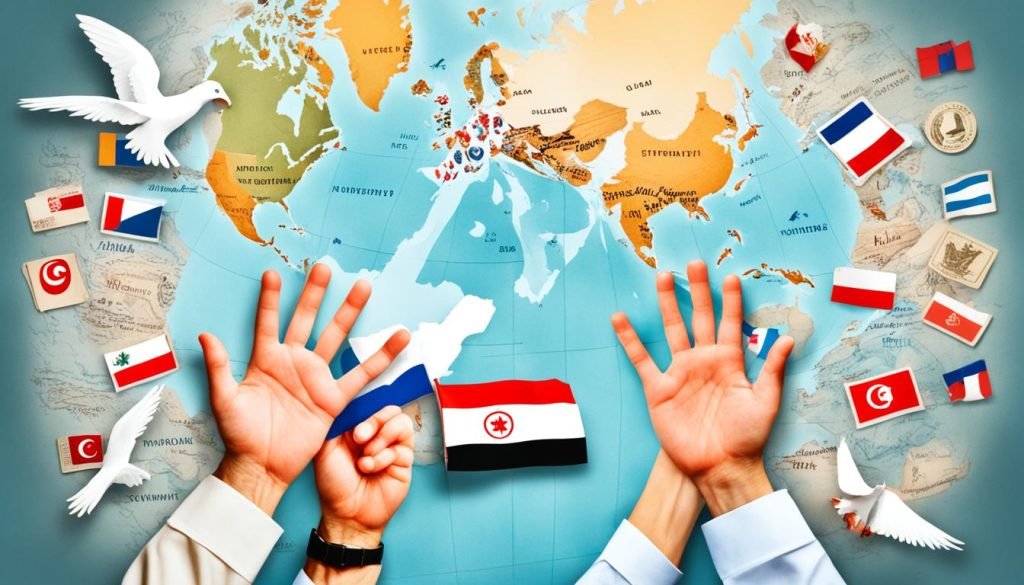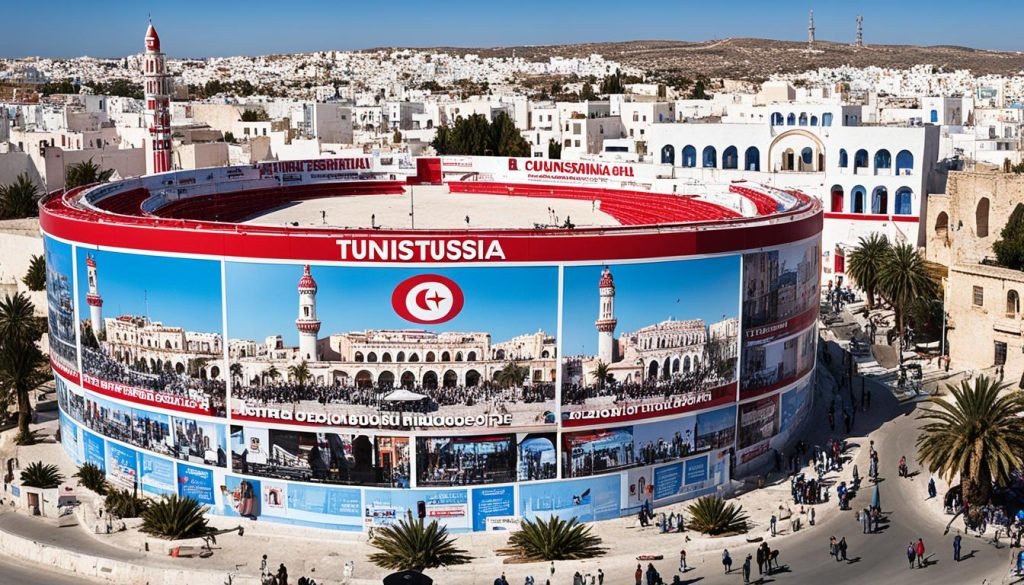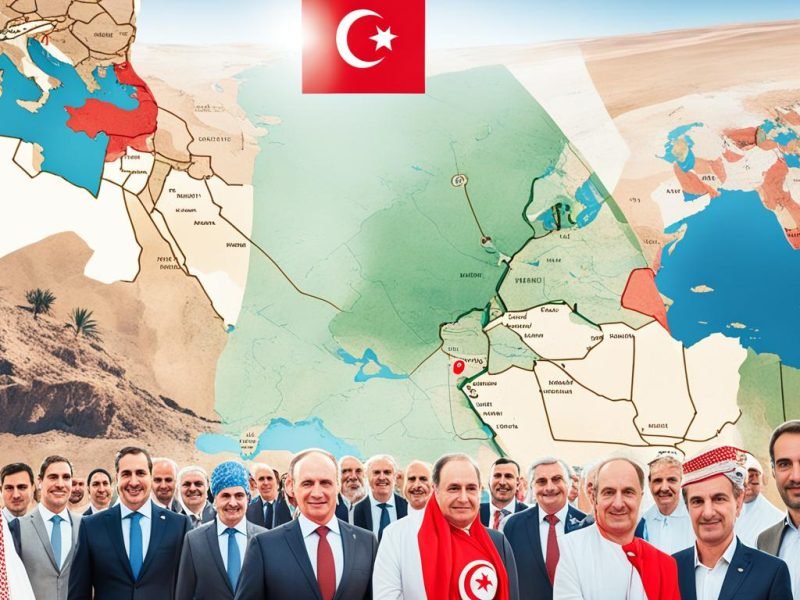Walking through Tunis, I notice many ads for Russia Today. This shows a trend in Tunisia foreign policy towards Russia. Is Tunisia leaning towards Russia instead of the West? The drop in the West’s popularity here suggests Tunisia might be seeking new friends. The visit of Russia’s Foreign Minister Sergey Lavrov to Tunisia is significant. He talked with President Kais Saied about more trade in energy and agriculture.
Looking deeper into Tunisia stance on Russian involvement, I found it’s not just about trade. It seems Tunisia might be moving away from the West. This change comes as the West pulls back following conflicts like the Israel-Hamas war. According to Arab Barometer, the US lost favor in the region by 30 percentage points. This loss has created a space that Russia is eager to fill. Is Tunisia ready to shift its foreign policy focus amid such changes? It’s time to explore this interesting diplomatic shift.
Key Takeaways
- Advertisements for Russia Today suggest a growing Russian influence in Tunisia’s capital.
- Russia’s engagement with Tunisia, including high-level visits, mark a potential shift in Tunisian-Russian relations.
- The decline in US popularity in North Africa could be ushering in an opportunity for Russia’s increased presence.
- Tunisia is possibly diversifying its foreign policy by strengthening trade and political ties with Russia.
- Tunisian leadership’s interactions with Russian officials may signify a nuanced foreign policy approach amidst international tensions.
Tunisia-Russia Relations: A Historical Perspective
Looking into Tunisia-Russia history highlights the intricate diplomatic relations they have. Since gaining independence, Tunisia carefully handles its foreign policies. It keeps a balance between its ties to the East and the West.
A Brief Background of Diplomatic Ties
In 1956, when Tunisia got its independence, it began diplomatic relations with the then Soviet Union. This was the start of a long friendship. Tunisia and the Soviet Union exchanged ambassadors, opening doors in Tunis and Moscow.
The Soviet Era and Post-Independence Interaction
After its independence, Tunisia worked closely with the Soviet Union. They showed each other mutual respect and worked together in many areas. This time was marked by economic aid and sharing cultures.
From Tunisian Independence to Present Day Dynamics
The journey from Tunisia’s independence to now shows how Tunisian-Russian ties have grown. Even after the Soviet Union ended, Tunisia quickly recognized Russia. This kept the diplomatic ties strong. Now, their relationship has deepened into mutual development and strategic teamwork. This shows how diplomatic relations change to meet the world’s and the regions’ needs.
Today, the relationship between Tunisia and Russia is still going strong. It shows that the friendship built since Tunisia’s independence continues. Their ongoing diplomatic work highlights a legacy of cooperation built over many years.

Current Tunisian Foreign Policy Towards Russia
Russia is playing a big part in North Africa, especially in Tunisia. This shows Russia’s big plans on a global scale. Because of changes in western influence, Tunisia and Russia are getting closer in politics and economy.
Russia’s Growing Influence in North Africa
Russia is making its mark in Tunisia and all over North Africa with smart moves. They’re talking more and visiting each other often. This helps Tunisia and Russia get along better. Russia’s ideas at big meetings match what Tunisia thinks about world issues. So, their goals are similar.
Trade and Economic Relations between Tunisia and Russia
Tunisia buys a lot of important things like wheat and fuel from Russia. This is very important for Tunisia to keep its economy stable. Even when the world is uncertain, like with problems in Eastern Europe, Tunisia keeps a good trade balance with Russia. This is key for Tunisia’s big plans in the world.
Below, you can see the main things Tunisia buys from Russia and why they are important:
| Commodity | Imported from Russia to Tunisia | Importance to Tunisia’s Economy |
|---|---|---|
| Wheat | Major Supplier | Essential for food security |
| Fuel | Significant Supplier | Critical for energy needs |
Russian Presence in Tunisia: Media and Diplomatic Engagements
Russia’s media influence in Tunisia is growing. You can see this through the ads and content from Russia Today. Russia wants to connect with Tunisia in culture and politics. Russian diplomats in Tunisia are also very busy. They have organized important events, like watching over the elections. This shows Russia’s deep interest in a strong friendship with Tunisia.

These diplomatic efforts are more than just simple tasks. They help us understand how countries interact on the world stage. For example, Russia quickly set up missions for Tunisia’s elections. This shows they care about Tunisia’s peace and leadership.
| Engagement Type | Examples | Impact |
|---|---|---|
| Media Outreach | Russia Today advertisements | Increases Russian cultural visibility |
| Diplomatic Initiatives | Observation mission in legislative elections | Supports political processes and enhances bilateral relations |
Russia uses media in Tunisia for more than just sharing news. It helps shape what people think and talk about. Diplomatic missions also play a part. They show Russia as an important friend to Tunisia. Together, media and diplomacy help grow Russia’s influence in Tunisia.
Does Tunisia Support Russia Amidst Global Contentions?
I find Tunisia’s relationship with Russia very interesting. Around the world, people are watching how countries interact. Tunisia seems to be getting closer to Russia. This shows in their meetings and growing trade. It looks like they are becoming friends.
Tunisia is not just turning its back on old friends for Russia. They are thinking hard about their choices. They want to keep their old friends but also make new ones in Russia. Tunisia is smart in how it deals with other countries.
Tunisia is being very careful with its choices. Some people might think Tunisia fully supports Russia. But, Tunisia is really just being wise. They are keeping their options open. This is smart because the world is always changing.







